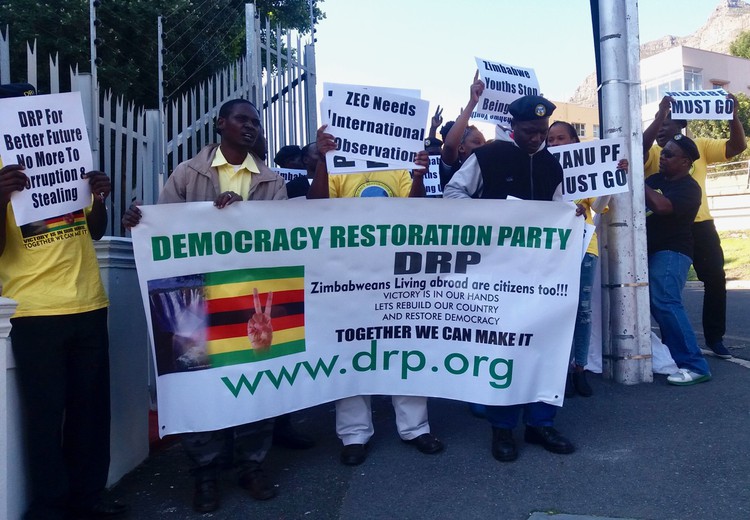
President Jacob Zuma was slammed as being irrational for the recent cabinet reshuffle.
GCIS
In popular conceptions of what it means to be human is the universal notion that our species - homo sapiens - is essentially rational. It’s commonly believed that as rational beings, our thoughts and actions are informed by reason and logic that precludes the influence of emotions. On the other hand, irrationality is associated with defective reasoning, perverse thinking, being excessively emotional, or at worst, crazy.
Democracy, and by extension good governance, presupposes the capacity of political leadership to engage in reasoned debate, informed decision making and measured judgements. In the South African context, it’s assumed that this will all happen within the framework of the Constitution.
In this way democratic governance is premised on rationality. It appears to be unthinkable without it. But is this true?
No. And certainly not in South Africa now. Irrationality is the term frequently used to describe the country’s political landscape. This is clear from the coverage of the embattled government of President Jacob Zuma, and its leadership.
The growing anxiety and uncertainty in the country is aptly articulated by the news headline:
Has Zuma checked reason and rationality at the door?
In the unfolding drama of the far-reaching political scandal that threatens South Africa’s nascent democracy, known as “Guptagate”, political leadership has been repeatedly called out for its irrational behaviour. In response to Zuma’s most recent cabinet reshuffle where he replaced finance minister Pravin Gordhan, Bonang Mohale, deputy chairperson of Business Leadership South Africa, said:
We have the President [Zuma] to thank for all this turmoil, irrationality and absolute recklessness…
For its part, the opposition Democratic Alliance went to court to have the president’s decision set aside on the grounds that it was irrational and unconstitutional.
More recently the South African Reserve Bank, known for its conservative stance, openly accused the Public Protector of being reckless and irrational in her attempts to amend the Constitution. Her recommendations in a report on a bank bailout, has been widely viewed as beyond the mandate of her office and a threat to the stability of the economy.
The use of the word “irrational” in South Africa’s political debates begs interrogation. Increasing accounts of political irrationality naturally raise concerns about the effectiveness of democratic governance – and its legitimacy.
Dispelling the ‘myth’ of rationality
Irrationality as a ubiquitous descriptor of political machinations is not peculiar to South Africa. It is well documented across climes and cultures. US President Donald Trump immediately comes to mind. As a world leader he has elicited both censure and derision as grossly irresponsible and fundamentally irrational.
The fact is humans are not rational by default. The “invisible hand” that drives human behaviour is in fact, irrationality. Nobel laureate, psychologist Daniel Kahneman together with Amos Tversky and others have pioneered research in this field.
Wired by evolution, cognitive limits restrict how we select, compute, store and adapt to information. Research shows that we employ a range of heuristics (mental shortcuts) that lead to cognitive biases and distorted perceptions. Most of these we’re not even aware of. As behavioural economist Dan Ariely, author of “Predictably Irrational: The Hidden Forces That Shape Our Decisions” asserts:
Our irrational behaviours are neither random nor senseless – they are systematic.
For example, humans have the tendency to select information (selection bias) that confirms preexisting beliefs (confirmation bias) while avoiding contradictory information that disturbs their preferred worldview. This well-researched bias is at work when politicians choose to present skewed, biased evidence that makes them look credible with the public to achieve desired outcomes.
There’s also a self-interested bias where people are prone to distorted thinking because it benefits them in some way. Rational irrationality explains how:
(people) choose - rationally - to adopt irrational beliefs because the costs of rational beliefs exceed their benefit.
This goes some way in explaining the reckless actions of politicians like Zuma and Trump who devise irresponsible strategies in the interests of their “rational” endgame.
Neuroscience shows that when it comes to decision making, humans are wired to favour emotions over intellect. This means emotions have an impact on our decisions in various ways. For example, in the face of deep uncertainty – a persistent feature of our age – unconscious emotions and perceptions render us prone to cognitive biases and errors.
This refutes the ideal of the stoic “rational man”, a description that persistently devalues women and castes them as the “weaker” sex. This stereotype – of women as emotionally volatile and incapable of rational thought – has served to exclude them from the corridors of power.
Political irrationality has dire consequences
Because irrationality is inherently human, it’s been a persistent part of politics throughout history. There’s substantial evidence that entrenched and unchecked irrationality has devastating consequences. This has happened when political leaders eschew reason and logic. In South Africa’s case this is clear from the country’s crippled economy and rising discontent.
Lyn Snodgrass, Associate Professor and Head of Department of Political and Conflict Studies, Nelson Mandela University
This article was originally published on The Conversation.













